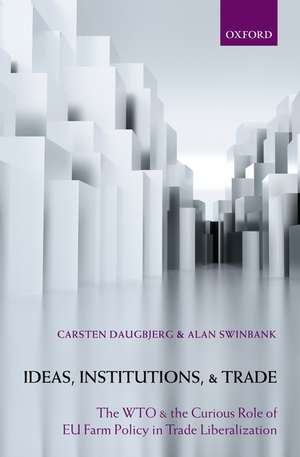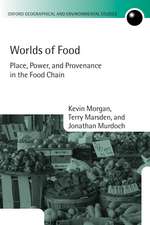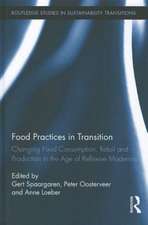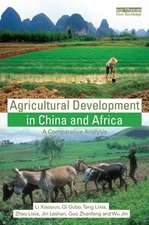Ideas, Institutions, and Trade: The WTO and the Curious Role of EU Farm Policy in Trade Liberalization
Autor Carsten Daugbjerg, Alan Swinbanken Limba Engleză Hardback – 3 sep 2009
Preț: 715.58 lei
Preț vechi: 1028.27 lei
-30% Nou
Puncte Express: 1073
Preț estimativ în valută:
136.92€ • 143.34$ • 113.30£
136.92€ • 143.34$ • 113.30£
Carte tipărită la comandă
Livrare economică 26 martie-01 aprilie
Preluare comenzi: 021 569.72.76
Specificații
ISBN-13: 9780199557752
ISBN-10: 0199557756
Pagini: 256
Ilustrații: 14 figures, 10 tables
Dimensiuni: 161 x 240 x 19 mm
Greutate: 0.54 kg
Ediția:New.
Editura: OUP OXFORD
Colecția OUP Oxford
Locul publicării:Oxford, United Kingdom
ISBN-10: 0199557756
Pagini: 256
Ilustrații: 14 figures, 10 tables
Dimensiuni: 161 x 240 x 19 mm
Greutate: 0.54 kg
Ediția:New.
Editura: OUP OXFORD
Colecția OUP Oxford
Locul publicării:Oxford, United Kingdom
Recenzii
With the fate of the Doha Development Agenda (DDA) round still unclear and the EU probably heading, once more, towards a reform of its policies for agriculture and rural development, the book by Daugdjerg and Swinbank provides timely and valuable food for thought.
there is much to admire in Daugbjerg and Swinbank's Ideas, Institutions and Trade - its focus on an area of trade policy often overlooked by political economists (i.e. agriculture); its attempt to interweave ideas and institutions into a narrative on European Union agricultural trade policy; and its attention to detail in the policy process ... as a framework for understanding the EU evolution in agricultural policy, Ideas, Institutions, and Trade is certainly a welcome and well-researched contribution to the literature on agricultural trade.
In this relatively short and insightful book, Professors Daugbjerg and Swinbank have managed the considerable feat of making the changing international governance of agricultural trade in the World Trade Organisation (WTO) and the history of reforms of the European Union's (EU) Common Agricultural Policy (CAP) interesting and rewarding for professional agricultural policy-watchers and non-specialists alike... Strongly recommended.
The book is very stimulating and, in my opinion, a 'must' for those interested in the CAP policy reform process and multilateral trade negotiations. The set of the potential beneficiaries is quite ample, from graduate students who will find it a very good introduction to the evolution over time of agricultural trade negotiations and the forces behind them, to, at the other end of the spectrum, researchers into agricultural and trade policies and their making Trust me, even if not fully convinced by the analytical framework proposed in the book, you will certainly enjoy the read and benefit from it, as you will be forced to give the 'story' very well developed in the book serious thought and, in so doing, it will help clarify some of your own ideas.
offers a remarkably clear and insightful account of trade liberalization in agriculture. Daugbjerg and Swinbank's volume developing their previous work brings a comprehensive and innovative approach to develop our understanding of the complex structure of the EUs agricultural reform and its relationship with trade liberalization within Gatt/WTO
This book, by two of our most distinguished commentators on the process of agricultural policy reform, investigates the dynamic interrelationship between WTO farm trade negotiations and CAP reform...The analytical framework used by the authors gives us many useful insights, which alone make the book worth reading.
The declared aim of this book, a collaborative endeavour between Carsten Daugbjerg, a political scientist, and Alan Swinbank, an agricultural economist, is to explain the pivotal role of agriculture, especially the EU's stance on farm policy, in international trade relations ... The authors are to be praised for the way they have managed to avoid the all-too-common issue of economic interests which are usually applied when explaining conflicts in international trade negotiations. They have succeeded admirably in their aim of applying ideas and institutions to explain the role of the EU farm policy in trade liberalisation. In sum, this book should be regarded as an important contribution to the political science literature, and therefore is highly recommended to those interested in EU policy making, agriculture and international trade.
there is much to admire in Daugbjerg and Swinbank's Ideas, Institutions and Trade - its focus on an area of trade policy often overlooked by political economists (i.e. agriculture); its attempt to interweave ideas and institutions into a narrative on European Union agricultural trade policy; and its attention to detail in the policy process ... as a framework for understanding the EU evolution in agricultural policy, Ideas, Institutions, and Trade is certainly a welcome and well-researched contribution to the literature on agricultural trade.
In this relatively short and insightful book, Professors Daugbjerg and Swinbank have managed the considerable feat of making the changing international governance of agricultural trade in the World Trade Organisation (WTO) and the history of reforms of the European Union's (EU) Common Agricultural Policy (CAP) interesting and rewarding for professional agricultural policy-watchers and non-specialists alike... Strongly recommended.
The book is very stimulating and, in my opinion, a 'must' for those interested in the CAP policy reform process and multilateral trade negotiations. The set of the potential beneficiaries is quite ample, from graduate students who will find it a very good introduction to the evolution over time of agricultural trade negotiations and the forces behind them, to, at the other end of the spectrum, researchers into agricultural and trade policies and their making Trust me, even if not fully convinced by the analytical framework proposed in the book, you will certainly enjoy the read and benefit from it, as you will be forced to give the 'story' very well developed in the book serious thought and, in so doing, it will help clarify some of your own ideas.
offers a remarkably clear and insightful account of trade liberalization in agriculture. Daugbjerg and Swinbank's volume developing their previous work brings a comprehensive and innovative approach to develop our understanding of the complex structure of the EUs agricultural reform and its relationship with trade liberalization within Gatt/WTO
This book, by two of our most distinguished commentators on the process of agricultural policy reform, investigates the dynamic interrelationship between WTO farm trade negotiations and CAP reform...The analytical framework used by the authors gives us many useful insights, which alone make the book worth reading.
The declared aim of this book, a collaborative endeavour between Carsten Daugbjerg, a political scientist, and Alan Swinbank, an agricultural economist, is to explain the pivotal role of agriculture, especially the EU's stance on farm policy, in international trade relations ... The authors are to be praised for the way they have managed to avoid the all-too-common issue of economic interests which are usually applied when explaining conflicts in international trade negotiations. They have succeeded admirably in their aim of applying ideas and institutions to explain the role of the EU farm policy in trade liberalisation. In sum, this book should be regarded as an important contribution to the political science literature, and therefore is highly recommended to those interested in EU policy making, agriculture and international trade.
Notă biografică
Carsten Daugbjerg is Professor of Trade and Food Policy in the Department of Political Science at the University of Aarhus, Denmark, where he has been since 1998. His research has focussed on agricultural policy (in particular reform of the Common Agricultural Policy: CAP), environmental policy, agricultural trade negotiations in the WTO, government-interest group relations and to a lesser extent EU food safety policy. He has had three books published and has published articles in international journals such as Comparative Political Studies, Journal of Common Market Studies, Journal of European Public Policy, Governance, Journal of Public Policy, Environmental Politics, Australian Journal of Political Science and Scandinavian Political Studies.Alan Swinbank recently retired as Professor of Agricultural Economics at the University of Reading, UK, where he had been since 1977. In the mid-1970s he spent four years as a junior administrator in the Directorate-General for Agriculture in the Commission of the European Communities. His research and teaching focussed on the food and farm policies of the EU, and on the WTO (World Trade Organization) process of agri-food trade liberalization. He has lectured and written extensively on these topics. In recent years he has published in the European Review of Agricultural Economics, the Canadian Journal of Agricultural Economics, Food Policy, the Journal of Common Market Studies, the Journal of World Trade, The World Economy, and others.








